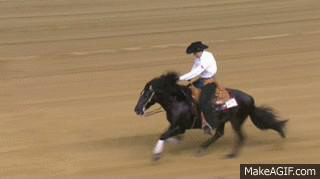International WEG Reining: The New Kids on the Block
With the last qualifying round for the individual finals on the books before Saturday’s championship, we have time to take a look at the incredibly diverse field at this year’s WEG reining.
Anyone paying attention in the reining world has noticed the steady growth of reining abroad (those Belgians really got a foot in the door early to put themselves consistently at the top of European reining.) But for anyone outside of the discipline, the news that there’s a heck of a battle going on in Caen this week for top reining honors might come as a bit of a surprise: yes, the American team with its incredible depth still took home team gold handily on Tuesday, but it was a great contest for silver and bronze with five or six teams just a few points apart. Saturday night’s individual finals are shaping up to be a great reining–okay, yes, Shawn Flarida’s 229.5 (let’s repeat that–TWO TWENTY NINE AND A HALF) score in the team competition suggests that the Five Million Dollar Man will probably continue to dominate, but there are several strong contenders for silver and bronze from outside of the United States.
Let’s break down the team results: I’ve listed the top ten teams out of sixteen teams total.
The top three scores on each team were combined with the fourth and lowest score discarded.
Gold: United States, 677.5
Silver: Belgium, 663.0
Bronze: Austria, 658.5
Fourth: Germany, 654
Fifth: Australia, 653
Sixth: Italy, 647.5
Seventh: Brazil, 647
Eighth: United Kingdom, 645
Ninth: Canada, 642
Tenth: France, 640
Other participating teams–not counting individual representatives of countries without teams–included Poland, Netherlands, Denmark, Finland, Sweden and Mexico.
So what are these international teams riding? Quarter horses, for the most part–the European countries are working hard to develop their breeding programs and have been producing some quality animals capable of putting their riders on the medal podium. The 2014 WEG is a big step up in terms of native horsepower from the 2010 Kentucky competition, in which many of the overseas teams borrowed horses supplied by the United States with a week or two to get to know them. (That’s a heck of a catch ride.) Of course there are many competitors this year who are training in the United States but riding for their native country–but there’s an equal number riding their very own homebred-in-Europe American Quarter Horses. That’s two big things that the US has exported for the horse world.
But even more fascinating were the Chileans this year–their first year competing in the World Equestrian Games in reining. Chile has found that its own native-bred Chilean horse is very talented in the reining pen. The Chilean horse is an Iberian-descended stock horse, used extensively on the ranch for working cattle. Unlike the Quarter horse, who has been refined through outcrosses with other breeds, the Chilean horse has remained pure thanks to the oldest registry in the Americas, far pre-dating the Quarter horse. They reminded me of an Andalusian, but stocky and compact for working a cow–a unique but memorable combination. With a ranching pedigree it makes sense that these hardy and athletic animals would shine in the reining arena. Two Chilean individuals competed this year on homebred Chilean stallions, and though neither qualified for Saturday night’s final they set a great standard for Chile to look to beat in 2018.
Chilean stallion Quimpomay Torero ridden by Daniel Martins Cruz
Other individuals of the 81 starters represented the Dominican Republic, South Africa (a WEG reining first), Morocco (another WEG reining first, and an absolutely amazing performance for a rider who has been reining for only two years) Hungary, Israel and Switzerland. The crowd was electric for every one of these individual performances, as though every spectator realized they were seeing history made in Caen.
With such fantastic qualifying rounds and a tight and competitive list of starters for Saturday, it seems safe to say that reining is here on the international stage for the long haul. The only place left to go is up.









Leave a Comment